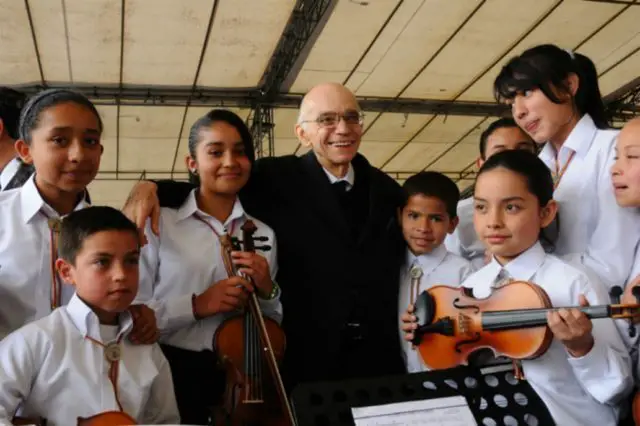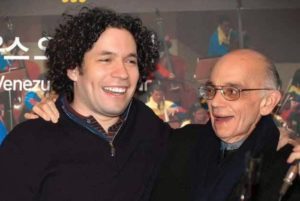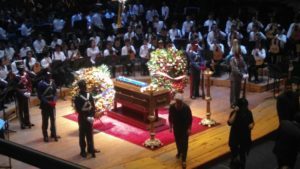The Venezuelan director, who founded the System of Children and Youth Orchestras to help fight poverty, died at the age of 79.
The System of Children’s and Youth Orchestras of Venezuela confirmed last Saturday (March 24th, 2018) the death of its founder, José Antonio Abreu, at the age of 79, after fighting a long illness. The musician and director, an economist by profession and award-winning composer and interpreter of piano, harpsichord, and organ, was known as “El Maestro” and left, as a legacy, a work that directly impacted Venezuelan society.

In 1975, Abreu created the System of Children’s and Youth Orchestras with the aim of systematizing the instruction and collective and individual practice of music, as well as presenting an option to lift millions of young people out of poverty. The project has lasted for decades and overcome ideological differences of the governments, becoming creditor for it of numerous prizes, between which the Prince of Asturias of the Arts is counted.
The Venezuelan Minister of Culture, Ernesto Villegas, lamented the national loss with a message on Twitter in which he published: “The pentagram and the Fatherland mourn the teacher José A. Abreu, who since young has excelled for his intelligence, virtuosity, and leadership”. Also, President Nicolás Maduro expressed his regret. “Maestro Abreu transcended. Thanks for everything you gave us”, he said during a meeting at the Government House.
A work imitated around the world
José Antonio Abreu was born in the western town of Valera, Trujillo state (Venezuela) on May 7th, 1939. From a young age, he showed many artistic skills. He was convinced of the transforming power of music and his project was emulated in several countries of the world. “The system is a social project because it aspires to apply music to the development of man, and national because it aspires to the whole country to participate in it”, he said in a recent interview.
Orchestral director Gustavo Dudamel, who was trained in the music system, expressed his mourn and respect on Twitter. “With all my love and eternal gratitude to our father and creator of the system”, he wrote. Abreu is one of the most important musicians of Venezuelan musical culture, recognized by UNESCO, and honored with the Order of the Rising Sun, the Polar Music Prize, awarded by the Royal Swedish Academy of Music, along with other recognitions.

There are many organizations and international organizations that recognize “El Sistema” as a unique music education program, worthy of being implemented in all the nations of the world and, mainly, in those countries that seek to reduce their levels of poverty, illiteracy, marginality, and exclusion in its very young population.
Music education programs that follow the Venezuelan model have been created in more than 35 countries. Among these countries are: Argentina, Australia, Austria, Bolivia, Brazil, Canada, Chile, Colombia, South Korea, Costa Rica, Cuba, Ecuador, El Salvador, Scotland, United States, France, Guatemala, Japan, Honduras, England , Italy, Jamaica, India, Mexico, Nicaragua, Panama, Paraguay, Perú, Portugal, Puerto Rico, Dominican Republic, Trinidad and Tobago, and Uruguay.
The System inspired the OAS to promote the creation of the Youth Orchestra of the Americas, which debuted in 2000 in New York, and the Orchestra Program for Youth at Risk in the Caribbean in 2009. Similarly, the Youth Ibero-American Symphony Orchestra was born, making its debut in 1997 with the support of the Andrés Bello-UNESCO agreement, and within the framework of the 7th Ibero-American Summit of Heads of State. Also inspired by El Sistema, the Andean Development Corporation, the financial arm of the Andean Community of Nations (Bolivia, Colombia, Ecuador, and Peru), promoted a system of youth choirs in that region.
The creation of Musequality, a charity dedicated to the development of musical projects for children from the most disadvantaged sectors of developing countries, was inspired by El Sistema and other music education programs that are being implemented in different parts of the world. The objective of Musequality, like El Sistema, is to give children at risk the opportunity to acquire skills that help them escape poverty, away from the streets, drugs, violence, and crime.
In November 1995, UNESCO appointed Maestro José Antonio Abreu as a special delegate for the development of a worldwide system of youth and children’s orchestras and choirs, with the purpose of promoting and spreading the Venezuelan model throughout the world.

In 2009, the Simón Bolívar Musical Foundation, together with the New England Conservatory of Music, the TED Prize, TED and the Quincy Jones MusiQ Consortium, among others, created a support network called El Sistema USA. It supplies vast information about the philosophy and methodology used by El Sistema, as well as a variety of resources, to people and organizations around the world that work in the creation and expansion of programs inspired by El Sistema. The 1st initiative of El Sistema USA is a postgraduate program for young and talented musicians who wish to become ambassadors of El Sistema and are committed to developing this program outside of Venezuela.
